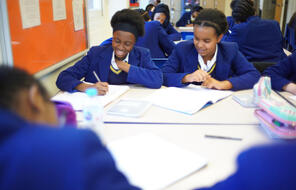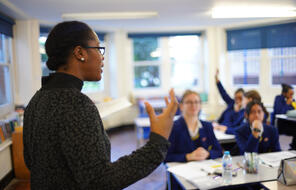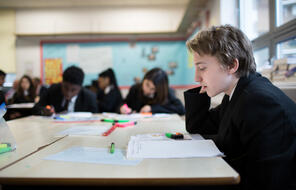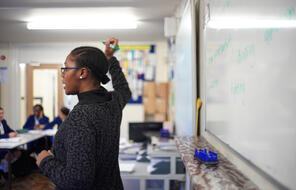Alignment with Ofsted Requirements
Read about how Teaching an Inspector Calls assists teachers and schools in fulfilling a range of statutory and non-statutory requirements as outlined in the 2019 Ofsted inspection handbook.

Teaching An Inspector Calls
Use this unit to transform how you teach J.B. Priestley's play and support your students in becoming effective writers, critical thinkers, and socially responsible citizens, who excel in their GCSEs.
In addition to helping students prepare for their English Literature and English Language GCSEs, Teaching an Inspector Calls also assists teachers and schools in fulfilling a range of statutory and non-statutory requirements. These requirements are aligned below with the 2019 Ofsted inspection handbook and include:
- Quality of Education
- Behaviour and Attitudes
- Personal Development
- Spiritual, Moral, Social and Cultural Development (SMSC)
- Relationships and Sex
- ‘Prevent’ Duty
Quality of Education (p.41)
Intent (172, p. 41)
- The Facing History and Ourselves unit ‘Teaching An Inspector Calls’ is an ambitious scheme of work designed to give all learners the knowledge that they need to succeed in life.
- The unit is coherently planned: it facilitates the accumulation of knowledge and each of the lessons builds upon the previous ones.
- The unit prepares students to reach a clear end point, which is to write effectively in their English GCSE exams (though the skills they gain will also help in other areas).
- The transferable skills-based approach prepares students for future learning and employment, empowering them to take advantage of opportunities, responsibilities and experiences in later life.
Cultural Capital (178, p. 43)
- The teaching of a famous and well-regarded play gives students cultural capital, and an avenue through which to learn critically about contextual information and to reflect on human behaviour.
Implementation (183, p. 44)
- The unit gives teachers expert knowledge of An Inspector Calls and its sociohistorical context, providing relevant contextual information for teachers to access before teaching each lesson.
- The lessons support teachers in enabling pupils to understand key concepts; the content is presented clearly and promotes appropriate discussion. To this end, teachers are given a range of questions that promote comprehension and critical engagement.
- The class discussions, given questions and marking codes give teachers an opportunity to check their learners’ understanding systematically, identify misconceptions accurately and provide clear, direct feedback.
- A rigorous approach to the teaching of reading develops learners’ confidence and enjoyment in reading.
- Teaching is designed to help learners remember the content they have been taught in the long term, and students are often given a choice in activities to facilitate such retention.
- The content is sequenced so that the later lessons build upon the skills and content taught previously in the unit (and in other English lessons), and develop students’ skills to become critical readers and effective writers.
- A range of opportunities for assessment are built into the unit: the given questions and activities, small-group and class discussions, and homework opportunities allow teachers to formatively assess pupils, whilst the writing tasks create opportunities for summative assessment. The recommended use of marking codes for the written tasks enables students to develop and internalise their skills and understanding.
- The resources and materials reflect the ambitious intentions for the course of study and support the intent of a coherently planned curriculum, sequenced towards cumulatively sufficient knowledge and skills for future learning and employment.
- This scheme of work reduces teacher workload by giving them a range of pre-planned lessons, complete with PowerPoints and resources.
Developing Understanding, Not Memorising Disconnected Facts (184, p. 45)
- The unit gives students ample opportunities to connect the content to their own lives and experiences, which enables students to connect new knowledge with existing knowledge. Students are also encouraged to look for links between the texts they study and the world beyond school, which is another means of facilitating knowledge retention as students are further encouraged to link their learning to what they already know and understand about the world.
Impact (193, p. 46)
- This scheme of work is well constructed, whilst the detailed lesson plans, which include clear overviews, relevant contextual information and instructions, help teachers deliver the content to a high standard.
- This scheme of work prepares students for success by developing the necessary reading and writing skills for them to succeed in their lives, as well as in their English GCSEs.
- The broad range of teaching strategies and activities work to help students develop as effective readers, writers and communicators, who are prepared for the next stage of education, employment or training.
Behaviour and Attitudes (202, p. 52)
- The role that students play in creating a classroom contract that outlines the expected norms of behaviour can foster a calm and orderly environment. As students play a role in the development of their classroom rules, they feel accountable for upholding the agreed upon norms and values.
- The use of contracting to foster a classroom community ensures that students understand the high expectations for their behaviour and conduct.
- The journalling, the reflections on individual and group identity, and the exploration of the impact and consequences of our choices and actions on others, encourages students to better understand themselves and others: such understanding can boost peer-to-peer and peer-to-teacher relationships.
- The content of the scheme of work lays the foundations for teachers and learners to create an environment where bullying, peer-on-peer abuse or discrimination are not tolerated.
Personal Development (216–18, pp. 58–9)
- The frequent opportunities for students to make connections between the learning and their own lives means the unit extends beyond the academic, technical or vocational.
- The teaching strategies and the content of the unit – the focus on social responsibility, the exploration of identity and on understanding the impacts of our choices and actions – equip young people to be responsible, respectful, and active citizens, who contribute positively to society.
- Students are encouraged to participate in their communities by writing speeches and letters to government bodies and/or local newspapers concerning pertinent social issues.
- Students develop their understanding of the fundamental British values:
- Democracy: They practise democracy in the classroom through their interactions with each other and by having the opportunity to share their opinions in discussions and debates.
- Liberty: Students make choices in their classroom environment, selecting tasks that feel relevant to them. Students also participate in discussions freely.
- Rule of Law: Students explore moral codes, and they explore the impacts of their choices and actions, recognising that they have consequences. They also work together to create their class contract.
- Respect and Tolerance: The content of the lessons and the classroom contract encourage a culture of respect and tolerance, in which students’ compassion and understanding of others is nurtured.
- Students explore the complex nature of identity, considering their own identity and those of others. This understanding helps students to value difference, helps to foster an inclusive environment, and supports learners in developing their character.
- Student resilience is developed by giving them the opportunity to engage in a range of activities where there is no right answer: students must debate, discuss and problem-solve together.
- Student confidence is boosted by giving students choice; this choice enables them to discover and develop their interests and talents. Student confidence is also developed when students are placed in the position of expert when they make personal connections between the topics studied and their own lives. The ample opportunities to practise spoken language skills and the focus on student progress also boost confidence.
- Student independence is fostered through the range of exercises that require critical thinking: these lessons do not spoon-feed students; they must do the brainwork.
- Students explore healthy relationships in the play by exploring the relationships between the characters, and by exploring the issue of consent in relation to one of the character’s behaviour.
- The development of communication skills and clear and coherent writing skills help prepare students for the world beyond school.
Spiritual, Moral, Social and Cultural Development (220, p. 59)
Spiritual Development (220, pp. 59–60)
- The frequent use of journalling and discussion, and the use of questions that encourage students to link the text back to the world beyond school, their lives and experiences, encourage students to be reflective. Meanwhile, the exploration of the link between values, identity and experiences encourages students to consider what shapes their own beliefs and perspectives on life.
- The use of contracting creates a safe classroom community and a culture of respect. This is reinforced by the range of activities that promote collaboration, and the fact that students are given opportunities to share their experiences and identities with their classmates when they feel comfortable doing so. The perspective-adopting exercises also help students consider the feelings of others, albeit fictional characters.
- The unit is engaging for students: students have the chance to debate, to be creative, to participate in drama, to respond to questions that are relevant to their own lives and their perspectives, and to work with others. We want students to relish the learning process and be enriched by it.
- There are a range of creative exercises that require students to use their imagination – these include writing tasks, mock court trials and drama/role play activities.
- The whole unit develops students to be reflective, critical thinkers, who reflect on who they are, how they came to be who they are and on their relationship with the world around them.
Moral Development (221, p. 60)
- By encouraging students to reflect on the impact and consequences of actions and decisions on others, students understand the power of individual agency and the ways in which our actions can harm others. Students develop this understanding by studying the morally bankrupt ways in which the various characters in the play use and abuse Eva Smith.
- The use of debates and discussions on moral and ethical issues requires students to use evidence-based reasoning and to listen to views different from their own.
Social Development (222, p. 60)
- In each lesson students work with others: they work in pairs, in groups, and participate in wider class discussion. These opportunities for discourse and collaboration help develop the necessary social skills students need to succeed in life.
- The use of contracting, journalling, and the focus on understanding behaviour, both one’s own and that of others, gives students the skills to better understand, and thus potentially solve, conflict.
- Many of the teaching strategies and activities used in this unit facilitate collaboration and cooperation.
- As outlined in the Personal Development section above, students develop their understanding of the fundamental British values: democracy, liberty, rule of law, and respect and tolerance.
- Students develop skills in critical thinking, in empathetic engagement, in communication and in cooperation that will allow them to participate fully in and contribute positively to life in modern Britain.
Cultural Development (223, pp. 60–1)
- The work on identity, particularly in the second lesson, encourages students to consider and appreciate the cultural influences that have shaped their heritage and that of others, as does studying a popular literary work and learning about the relevant sociohistorical context.
- Students are encouraged to consider the role that difference plays in dividing people, with the hope that it makes them less susceptible to adopt such patterns of behaviour. The work and discussion on identity and the perspective-adopting exercises help them appreciate the things we share in common.
Relationships and Sex Education (224, p. 61)
- Lesson 16 and GCSE Supplement 16.1 give students the opportunity to understand and discuss the nature of consent. This work lays the foundation for developing healthy relationships that are based on respect for others. Students also consider the impact that assault has on a person’s mental health and well-being.
Leadership and Management
‘Prevent’ Duty (243, pp. 66–7)
- The leadership and management of the school are expected to ensure the school fulfils its statutory ‘Prevent’ duty.
- The government’s most recent ‘Prevent’ duty guidance states: ‘All publicly-funded schools in England are required by law to teach a broad and balanced curriculum which promotes the spiritual, moral, cultural, mental and physical development of pupils and prepares them for the opportunities, responsibilities and experiences of life. They must also promote community cohesion. 1
- As outlined above, this scheme of work promotes the spiritual, moral, and cultural development of pupils, whilst also promoting community cohesion by encouraging students to work together, to understand themselves and to take responsibility for their actions.
- The development of students’ critical thinking skills also ensures that students are less likely to be led and will have a healthy scepticism to critique information that they encounter.
- 1Paragraph 58, Revised Prevent Duty Guidance, The Home Office, 10 April 2019.












